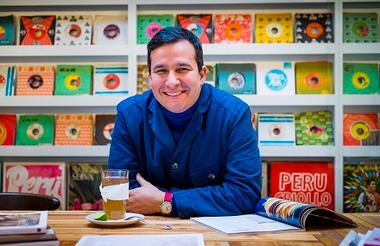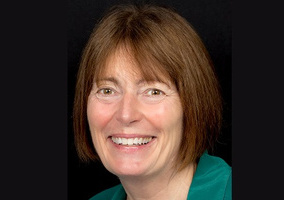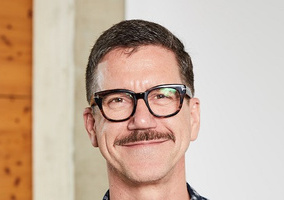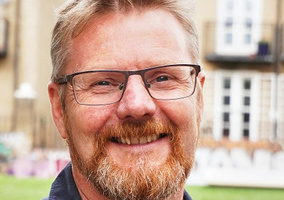Happy Friday, readers! This week, Society Diary sat down for a light-hearted chat with chief executive of the Institute of Imagination (iOi), Martin Allen Morales.
Peru-born Morales shared tales from his varied career, which included working with Miley Cyrus, collaborating with the Muppets and opening Paddington Bear’s favourite restaurant.
Read our conversation below.
Martin, what’s the first thing you do when you wake up?
“I start every morning with a little gratitude mantra. It’s kind of like a quiet prayer. I think about what I’m thankful for, send a bit of love to the people closest to me, and hold space in my mind for anyone going through something hard, whether it’s someone I know or just people out in the world facing pain or conflict.
“It’s a small thing, but it helps me start the day with heart. Before I check my phone or dive into the chaos, it’s my reminder to stay grounded, stay kind, and stay human.”
If you had a pound for every time someone asked what the iOi does, how rich would you be?
“We’d be building imagination hubs in every community across Britain. People love our name, Institute of Imagination, and even more, what we stand for. We help children, especially those facing tough challenges, dream bigger, grow in confidence, spark creativity, and build skills for a better future.
“A few years ago, our partner, the incredible Rev Gail Thompson, founder of Millennium Community Solutions and Ambassador of the Digital Poverty Alliance, asked me the same question. Once one of Britain’s top jazz musicians before MS changed her path, Gail now uses her voice to empower in deeper ways. Our shared love of music and belief in creativity connect us. And if we had a pound for every child who needed access to STEM, confidence, and space to imagine, we’d already be transforming lives at an even greater scale.”
What’s the best idea a child’s ever told you?
“Honestly, there have been so many! But one that really stuck with me recently, came from our place-based LEGO-funded Power of Play programme in Tower Hamlets. A child proudly showed me their idea: a flying robot with scales. Not just imaginative, but practical in their own way. They’d brought it to life through junk modelling and their unlocked creativity, and seeing their face light up when it actually worked was unforgettable.
“Another moment that moved me: a six-year-old, Felicity, said: ‘I enjoyed making the car work with coding, I’ve never done that before.’ That sense of discovery and pride, that’s what it’s all about.”
Who was easier to work with – Steve Jobs or Miley Cyrus?
“I bumped into Steve a couple of times when I worked in the founding team of five people at Apple iTunes Europe [now known as Apple Music]. And I worked with Miley when I led Walt Disney Music Group E.M.E.A. One of them gave me my first iPod, and the other received their first iPod from me. One reinvented the music industry, the other reinvented... Well, everything else. Both creative geniuses in their own right.
“Steve was intense, razor-focused, and had an almost eerie ability to see 10 steps ahead. Miley, on the other hand, brought energy, joy, and a wild, creative freedom that could turn a room into a party. She was chaos in glitter form, in the best possible way.”
Which Muppet did you hit it off with the most?
“When I was at Disney, the Muppets team made a genius version of Bohemian Rhapsody. It was a full-blown Queen classic, Muppet-style. I knew it was more than just a viral clip, so I went on a bit of a mission (okay, a full-on Muppet quest) to get the rights cleared.
“That meant tracking down Jim Beach, Queen’s legendary manager, and convincing him it was worth it. Rest assured, I got the green light.
“The press tour was magic. Miss Piggy was every bit the diva, and totally fabulous. But Kermit was the surprise. He was thoughtful, gracious, and somehow more grounded than most people I’ve worked with. Or at least, the person behind him was.”
Who’s harder to manage – a small charity team or a large corporate?
“Every organisation has its quirks. Large companies offer scale and systems. But in small charities, like the Institute of Imagination, you’re close to the magic. You see a child shining while designing a sustainable house made from recycled materials or a parent saying: ‘My kid has never lit up like this before.’ It’s personal, real, and deeply moving. It’s scrappier, but more soulful. Less budget, more imagination. Fewer rules, more freedom due to a flatter structure. And decisions are made with heart and a focus on the impact we can strive for, and not on hierarchy.”
What’s more enjoyable to write – a recipe book or a charity’s impact report?
“Writing my Ceviche and Andina books was like downloading recipes and memories; 250,000 copies of my heart and heritage, wrapped in personal stories and spice. They came from kitchens filled with laughter, Amarillo chilli, and Peruvian chicha music. Every recipe carried a memory: my great aunts’ cooking, my grandmother’s stories, my own travels through the Andes and how to make the perfect Tiradito.
“But writing an impact report for the Institute of Imagination is its own kind of beautiful. It’s not just charts; it’s the quiet magic of a child building a robot out of cardboard and whispering: ‘I didn’t know I could do stuff like this.’ It’s the wide eyes of a girl who realises she’s not just learning, instead she’s designing, engineering, creating. One feeds the belly; the other feeds the future. Both fed my soul.”
How are the UK’s surfing spots compared to those in other countries you’ve lived?
“Nothing compares to the longest left-hand wave in the world, Puerto Malabrigo, or Chicama, in northern Peru. The Pacific stretches endlessly there, the waves are sculpted and crystal clear, and the sunsets pour gold over the ocean. It’s where I go to feel small in the best way possible, held by Mother Nature, and close to my own mother, who lives just nearby.
“Taghazout in Morocco has become a recent love. Its warmth is more than just the weather. The waves are generous, the food rich with spice and soul, and the people are super welcoming. And in the UK, I find quiet joy along the coast near Lymington, where my in-laws live. There, the waves roll in a little rougher, and I get to share them with those I love.”
As someone born in Peru, how do you feel about Paddington Bear?
“I once opened a copy of the Evening Standard and read an interview with Paddington. He was promoting his first film and was asked what his favourite sport was, what city he would like to travel to next, and what his favourite restaurant was. He responded: ‘The other day I was walking in London’s Soho and I went to eat a delicious meal at a wonderful restaurant called Ceviche. I loved it. That’s my favourite restaurant.’
“He was talking about the first restaurant I opened, which was fraught with incredible challenges, including with fundraising, the council, Thames Water, and more. After everything we’d been through to open it, I was so touched by his response that I tracked down his PR manager and, without any expectations and almost as a bit of a joke, I sent her an email which read: ‘Please kindly let Paddington know that I am very grateful for his kind words about our restaurant and that he is welcome again any time.’
“I thought nothing would come from it, but a week later I got an email back: ‘Dear Martin, I forwarded your message to Paddington and he wanted me to let you know that he meant every word of it.’
“Wow. That touched my heart even more. That Christmas, my wife and kids gave me a lovely present: an apron with a picture of Paddington on it and the words: ‘He meant every word of it.’”
Which world leader do you think needs to play more?
“The leaders of the world’s biggest economies, because right now, some of their decisions are causing real harm to millions of the most vulnerable people on the planet. I genuinely believe that if they played more, they might reconnect with something essential they’ve lost: their sense of imagination, empathy, and wonder.
“Play has the power to unlock compassion, inviting curiosity and collaboration. Through play, they might recover the innocence and adventure of childhood, the part of them that dreams, explores, and cares. They might feel what it’s like to be loved and to love, to connect with others who are different from them, and to value that difference.
“Ultimately, play could remind them what leadership truly means: to imagine a fairer, greener world, and to act boldly in service of it, not just for their business allies, but for everyone. Maybe then, they’d sleep more peacefully. And we all might wake up to a better world.”












